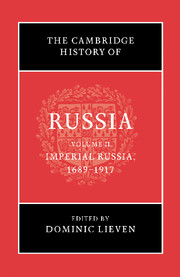Book contents
- Frontmatter
- Introduction
- Part I Empire
- Part II Culture, Ideas, Identities
- 4 Russian culture in the eighteenth century
- 5 Russian culture: 1801–1917
- 6 Russian political thought, 1700–1917
- 7 Russia and the legacy of 1812
- Part III Non-Russian Nationalities
- Part IV Russian Society, Law and Economy
- Part V Government
- Part VI Foreign Policy and the Armed Forces
- Part VII Reform, War and Revolution
- Bibliography
- Index
- Map 5. The Russian Empire (1913). From Archie Brown, Michael Kaser, and G. S. Smith (eds.) Cambridge Encyclopedia of Russia 1982.">
- Plate Section">
- References
6 - Russian political thought, 1700–1917
from Part II - Culture, Ideas, Identities
Published online by Cambridge University Press: 28 March 2008
- Frontmatter
- Introduction
- Part I Empire
- Part II Culture, Ideas, Identities
- 4 Russian culture in the eighteenth century
- 5 Russian culture: 1801–1917
- 6 Russian political thought, 1700–1917
- 7 Russia and the legacy of 1812
- Part III Non-Russian Nationalities
- Part IV Russian Society, Law and Economy
- Part V Government
- Part VI Foreign Policy and the Armed Forces
- Part VII Reform, War and Revolution
- Bibliography
- Index
- Map 5. The Russian Empire (1913). From Archie Brown, Michael Kaser, and G. S. Smith (eds.) Cambridge Encyclopedia of Russia 1982.">
- Plate Section">
- References
Summary
From Muscovy to the Early Enlightenment: the problem of resistance to ungodly rulers
Muscovites almost universally regarded the grand prince as anointed by God and thus as deserving obedience, or even reverence, but the obligation to obey him was contingent on his adherence to moral law and on his respect for an unwritten compact that was felt to constitute the foundation of government. Political actors and churchmen had the duty to render sound advice to the grand prince and to reprove him when his conduct departed from well-established Christian norms; the grand prince’s reciprocal obligations were to seek wise counsel and heed justified reproofs. When the grand prince stubbornly turned against godly ways, Christians were conscience-bound to disobey his spiritually inimical decrees. On this point there was strong consensus. Iosif Volotskii (1439–1515), usually classified as a supporter of princely absolutism, warned Christians not to obey an unrighteous ruler. The archpriest Avvakum (1620–82), who had once enjoyed a cordial personal relationship with Tsar Alexis Mikhailovich, instructed his flock, on becoming convinced of Alexis’s support for ‘heretical’ church reforms: ‘Place not your hope in princes, in a son of man, in whom there is no help.’ As a rule, Muscovite thinkers stopped short of calling for active resistance to the government. The customary recourse for morally outraged Christians was to flee from Muscovy or at least from areas under an evil grand prince’s immediate control. In the correspondence attributed to Prince Andrei Mikhailovich Kurbskii (d. 1583) and Tsar Ivan IV, the Kurbskii letters justified not only flight from Muscovy but service to the rival Lithuanian commonwealth. However, during the seventeenth-century controversy over new religious rituals, Old Believer monks at Solovetskii Monastery moved beyond flight, taking up arms in self-defence against the government.
Keywords
- Type
- Chapter
- Information
- The Cambridge History of Russia , pp. 116 - 144Publisher: Cambridge University PressPrint publication year: 2006
References
- 1
- Cited by

